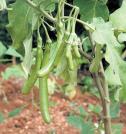Intro:
Natural Farming and Organic products are becoming popular at a fast pace in Mysore, thanks to R. Swamy Anand, State Convener of Karnataka State Natural Farming Movement and a resident of Jayalakshmipuram in City, who has made this happen by his sheer dedication, determination, consumer awareness programmes, workshops & seminars on Natural Farming and through his Green Shop ‘Hasiru.’
Originally from H.D. Kote taluk, Swamy moved to Mysore to pursue his Master’s degree. When Swamy was pursuing his Master’s, he had written an article on Taraka Dam and sent it to ‘Lankesh Pathrike.’ The editor of ‘Lankesh Pathrike’ was so impressed by the article that he not only published it but also appointed Swamy Anand as a journalist for ‘Lankesh Pathrike’ where Swamy Anand worked for 15 years.
Swamy Anand has also written a book in Kannada on Natural Farming.The book was awarded Karnataka Sahitya Akademi award in the year 2005 and nearly 65,000 copies of the book were sold. Swamy Anand is married to L. Geetha and the couple have three children. SOM spoke to Swamy Anand about his experience with Natural farming, Organic farming , Organic products and his shop Hasiru. Excerpts…
by Arafat Ahmed Aizaz

SOM: You were a Journalist. What made you take up Natural and Organic Farming as a profession?
Swamy Anand: I worked as a Journalist because of my writing skills. But I had more interest in Agriculture as my great grandfather, grandfather and father were all farmers. I knew what hardships farmers face and hence wanted to do something better for the farming fraternity. Farmers work hard but they do not know how to market their products in a better way. So I started ‘Hasiru’ to help farmers to market their products and to get them better price for their products. One more reason is “I love the traditional agriculture system – Natural Farming.”
SOM: How does your shop ‘Hasiru’ help farmers in getting better price?
Swamy Anand: I started ‘Hasiru’ in April, 2011. Since then, farmers directly approach me with their organic products and quote a rate for which their produce need to be sold. I will keep a very minimal margin on the rate quoted by them and will sell it at my shop, thus helping them in getting good price for their products.
SOM: How do you justify that Organic products are better than the products which are grown or made using chemicals?
Swamy Anand: Organic products are better in taste and have more nutrients. They are safe, non-poisonous and save the environment. Organic products are free from chemicals, artificial manure and artificial colours. Hence organic products are better when compared to those grown using chemicals.
SOM: You say that Organic products are non-poisonous. Do you mean to say that vegetables and fruits which are sold for lesser rates in the market are poisonous?
Swamy Anand: Yes, they are poisonous because they are grown by using chemicals and urea. They may not kill you immediately, but in the long run, they will create problems such as acidity, blood pressure and diabetes. Urea is highly dangerous. It not only spoils the soil but also creates health problems.
SOM: What are the activities conducted by ‘Hasiru’ in the recent past?
Swamy Anand: Hasiru has conducted Mango Mela, Grapes Mela, Millets Mela and Rajmudi Vaibhava – a mela where Rajmudi rice was sold.
SOM: Why did you name your shop as ‘Hasiru’?
Swamy Anand: One of my friends Sachidananda, an artiste, suggested me to name my shop as ‘Hasiru’ because I am a lover of agriculture and greenery.
SOM: Can you name some of the products you sell at Hasiru?
Swamy Anand: We sell organic Basmati brown rice, Organic Sonamasuri brown rice, Organic hand-made soaps, Organic teas, Organic coffee powder, Organic Foxtail millets & Little millets, Natural unprocessed forest honey, Organic Spirulina tablets, Organic perfumes, Organic wheat, Organic multi-grain malt, Organic Flax seeds, Desi ghee (Indian cow ghee) and many more. We get products from Ooty, Coorg, Maharashtra, Coastal Karnataka, Andhra Pradesh and other places.
SOM: How is the response for Organic products in Mysore?
Swamy Anand: The response is very good in Mysore. We have customers’ support. We have customers of all ages who are concerned about health and most of our customers are factory workers, because factory workers need quality food to get more nutrients and energy to do physical work.
SOM: Do you have any unique product at ‘Hasiru’?
Swamy Anand: We have a unique product ‘Love Tea’ which is made by using Organic Roses, Chamomile, Lavender and other flowers. It warms the heart. Youths are buying ‘Love Tea’ at our shop in large quantity to gift their friends.
SOM: The fruits and vegetables grown by Natural Farming look exactly similar to those grown by Chemical Farming. How do you prove that the fruits and vegetables available at ‘Hasiru’ are naturally grown?
Swamy Anand: Both look alike. But the taste of naturally grown food products is really good compared to those grown by Chemical Farming. Those who consume foods which are grown naturally do not get acidity problems. We can take you to our farms and prove that no chemicals are being used by us. One can even pay a surprise visit to our farms and check out what we are doing. People who consume naturally grown food products on a regular basis can feel the difference between the food products grown by natural farming and those which are grown by Chemical Farming.
SOM: Poor people can’t afford to buy the food products grown by Natural Farming or Organic Farming as they are very costly. What do you say about this?
Swamy Anand: The food products grown by Natural or Organic Farming are costly because the yield is low in these two types of farming as chemicals are not used to kill the pests. They are completely free from chemicals.
SOM: Which State is doing well in Natural Farming in India?
Swamy Anand: Karnataka is doing well. In Mandya district, 200 small villages have been certified as Organic Villages. Natural Farming and Organic Farming have a better future in Karnataka.
SOM: What are the challenges being faced in Natural and Organic Farming?
Swamy Anand: The main challenge is the labour problem. Both Natural and Organic Farming need more skilled labours when compared to Chemical Farming. These days, very less people are ready to work in the fields.
SOM: Natural farming is an old method. Do you think it can give better yield like that of Chemical farming?
Swamy Anand: I agree that the yield in Natural Farming is low when compared to Chemical Farming, but the whole world can be fed by Natural Farming. Hence, we should stop Chemical Farming and completely move into the path of Natural Farming.
SOM: Would you like to give any message to the public?
Swamy Anand: Yes. Government is treating Natural Farming as an alternative to Chemical Farming. According to me, Natural Farming should be given top priority for a better India and everyone should support it.
source: http://www.starofmysore.com / Star of Mysore / Home> Feature Articles / Wednesday , October 22nd, 2014









